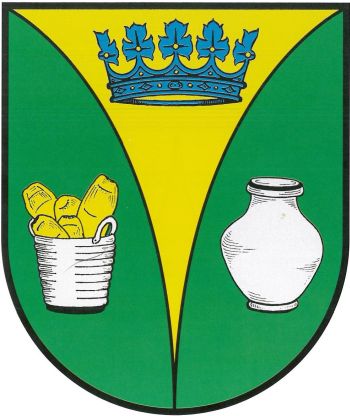Auderath: Difference between revisions
Knorrepoes (talk | contribs) m (Text replacement - " / Arms" to "/Arms") Tags: Mobile edit Mobile web edit |
Knorrepoes (talk | contribs) m (Text replacement - "{{media}} Literature : " to "Literature : {{media}} ") |
||
| Line 26: | Line 26: | ||
The urn refers to the Roman grave hills, excavated between 1936-40. The green field refers to agriculture and nature, as well as the medieval estate-farm in the village. | The urn refers to the Roman grave hills, excavated between 1936-40. The green field refers to agriculture and nature, as well as the medieval estate-farm in the village. | ||
[[Civic Heraldry Literature - Germany|Literature]] : | |||
{{media}} | {{media}} | ||
[[Category:German Municipalities A]] | [[Category:German Municipalities A]] | ||
Revision as of 11:55, 7 September 2022
This page is part of the German heraldry portal Deutsche Wappensammlung |
Heraldry of the World |
|
German heraldry:
|
Selected collector's items from Germany:
|
AUDERATH
State : Rheinland-Pfalz
District (Kreis) : Cochem-Zell (until 1969 Cochem)
Verbandsgemeinde : Verbandsgemeinde Ulmen
| German |
In Grün eine eingeschweifte gestürzte goldene Spitze, darin eine blaue Krone. Vorn ein silberner Korb mit goldenen Broten. Hinten eine silberne Urne. |
| English | No blazon/translation known. Please click here to send your (heraldic !) blazon or translation |
Origin/meaning
The arms were officially granted on August 5, 1992.
The blue crown is the symbol of Our Lady of the Holy Rosary, the local patron saint since 1938. The breadbasket refers to the tradition of the annual handing out of the Sebastianusbrot (bread of St. Sebastian) in the church.
The urn refers to the Roman grave hills, excavated between 1936-40. The green field refers to agriculture and nature, as well as the medieval estate-farm in the village.
Contact and Support
Partners:
Your logo here ?
Contact us
© since 1995, Heraldry of the World, Ralf Hartemink 
Index of the site












